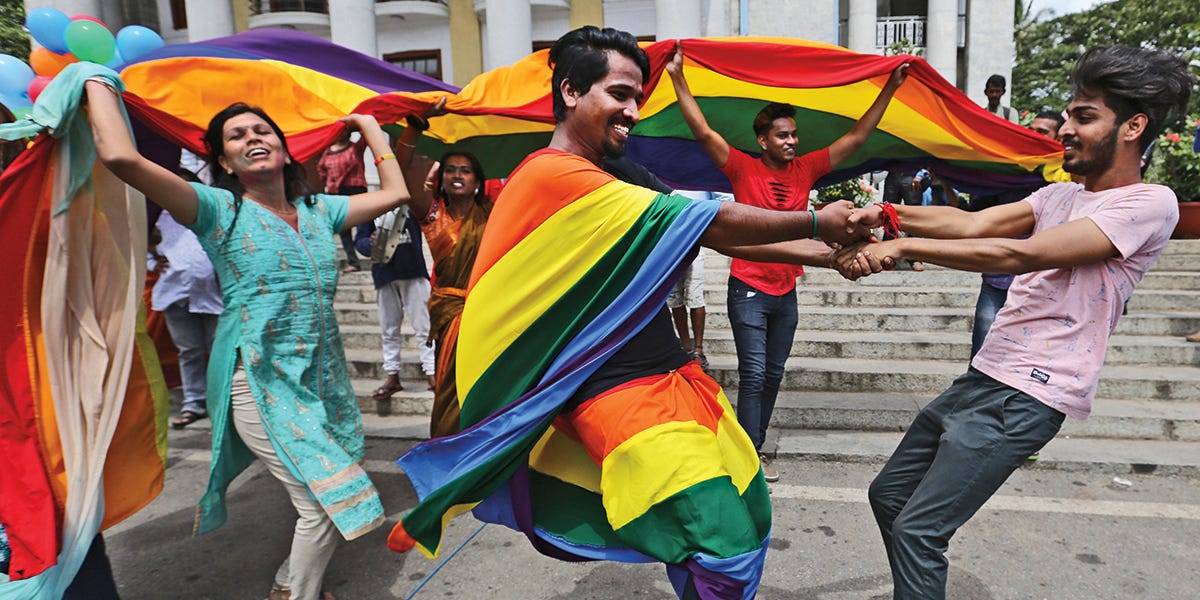India: The Supreme Court delivered its long-awaited same-sex marriage ruling, and it’s a big mixed bag for queer Indians. The headline is the court did not legalize same-sex marriage, but did order the government to do a whole host of things to expand LGBT rights.
The court found no right to marriage directly under the constitution, but indirectly because it affirmed that “sexual orientation” discrimination is included in the constitution’s ban on “sex” discrimination. It also affirmed that homosexuality/queerness is indigenous to India and not an imported Western or urban phenomenon.
Petitioners wanted the court to read the Special Marriage Act as being gender neutral, which the court refused to do, as that could cause cascading problems, particularly with regard to women’s rights. They felt this would be legislating from the bench.
The court split on whether queer Indians must have access to relationship recognition by the state, and left it up to the government to figure out how they would do that (ie, creating civil unions or same-sex marriage). The Chief Justice wanted to hold the government to its promise to the court that it would convene a committee that will determine how best to do this, and would have ordered that at a minimum, the recognition must imply: family rights, succession rights, right to form a joint bank account, pension rights, and hospital visitation/next-of-kin/medical decision rights. This only got the support of one other justice, while the other three said this was up to Parliament.
The Chief Justice would have struck down the ban on unmarried or queer couples from adopting effective immediately, but again the court split on this and ended up leaving it to Parliament.
The court did clarify that trans and intersex people who identify with one sex may freely marry a person of the opposite sex under existing law.
The court ordered the government to take a number of positive steps around LGBT rights, but most of these are just reiterating previous decisions of the courts:
· Governments must fight anti-LGBT discrimination, sensitize the public to LGBT rights, and establish a hotline and safehouses for LGBT people who face violence and discrimination.
· Governments must close conversion therapy providers, bar forced hormonal treatments used on queer people against their will, ban non-necessary surgeries on Intersex children, and include queer people in plans to fight suicide.
· Police must stop harassing queer people. They cannot demand they come to a police station just to question them about their sexuality, cannot force queer people to return to their families, and must protect queer couples from family violence.
It’s kind of remarkable that a Chief Justice that refused to legislate from the bench could issue such sweeping orders on issues that weren’t even discussed in the trial.
Queer Indians are disappointed at the ruling. The big talk about protecting equality and ending discrimination from the court did not pan out into very meaningful advances today. But there is hope that the ruling does push the government to advance some form of relationship recognition and expansion of queer rights.
But wait, there’s more around the world…
Japan: Fukui prefecture is the latest to announce it will start offering partnership certificates to same-sex couples – the scheme starts in November. That brings the total to 20/47 prefectures that have introduced a partnership system or is scheduled to start one.
Poland: Queers are celebrating the defeat of the conservatives and nationalists in this weekend’s election, and looking forward to a government that will enhance their rights.
Navajo Nation: Last week, a committee of the Navajo Council voted 13-6 to table the bill to legalize same-sex marriage in the nation’s territory, pending a further session within 30 days to decide if the council should hold a referendum on the issue or hold wider consultations with Navajo Chapter Officials.
The Navajo Nation is the largest of the USA’s self-governing native jurisdictions, covering an area that straddles Arizona, New Mexico, and Utah. Same-sex marriage is not legal or recognized there, although Navajo people are free to be married in other parts of the United States. Many native jurisdictions have legalized same-sex marriage, or have laws that simply conform to the laws of the federal government or state that the nation is in, but several dozen have not yet legalized same-sex marriage within their jurisdictions.
Meanwhile, in the States:
Florida: A Republican state rep has filed bills to repeal the state’s constitutional and statutory bans on same-sex marriage, marking the first time this issue has had bipartisan support. I would still say it’s a longshot that these bills advance in next year’s legislative session.
Oh, and I also have a story up on today’s Los Angeles Blade, previewing an upcoming Gala fundraiser for GLSEN, the nationwide advocacy group that helps build inclusive K-12 schools, which has become all the more necessary during the current moral panic. GLSEN will be honoring gay country star Orville Peck at the big gala.




